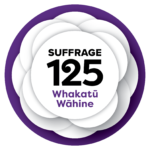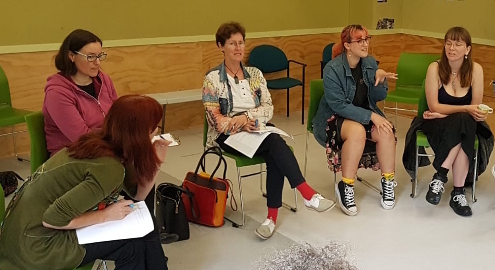In 1992, I received funding from the Suffrage Centenary Trust to write a play about women in parliament. Fast forward 25 years and, as the country prepared to celebrate the 125th anniversary of suffrage, I wondered, how well has the play stood the test of time and what would it be like to update it?
The original play,“Women Like Us”, tells the story of our first woman member of parliament, Elizabeth McCombs, alongside the story a fictitious contemporary woman politician and interwoven with cameos of several other historical figures. “Women Like Us” premiered at the Globe Theatre, Dunedin, in 1993 and toured to Taki Rua Theatre for the 1994 Wellington Fringe Festival. The production was directed by Anna Cameron, with the cast of Clare Adams, Mary Sutherland and Adrienne Ranscombe; lighting by Cathy Knowsley and poster by Prue Edge.
Re-reading the script, I was struck by how far we have come in the intervening 25 years – particularly thanks to MMP. Numbers of women in parliament have soared, we are up to our third woman prime minister and many other senior public positions have been held by women. And yet, in many other areas women are faring the no better or even worse. Pay equity is moving very slowly, domestic violence statistics are appalling and despite high profile campaigns, insidious or overt misogyny continues to impact significantly on nearly all women’s lives. Many of the improvements Elizabeth McCombs fought for in the1930s are still being fought for today, and I realised that the script was still highly relevant. With Magdalena Aotearoa, I applied for funding to update the script and create a schools resource pack so that it could be easily used in the classroom. We got the funding and the project is underway!

Updating the script has (not surprisingly) turned into a major rewrite. The stories of Elizabeth McCombs and other historical characters haven’t changed, but it quickly became evident that the fictional MP needed to go. Why have a fictional character when there are now so many real and amazing women MPs? To make the play more accessible and interesting to high school students, I replaced that character with three students whose school is holding mock elections as part of a project on democracy. This has increased the number of actors required (not a bad thing for school productions!) and expanded the range of issues that the play explores or references. It’s also created structural challenges: previously the stories of the two main characters followed similar chronological journeys, but this is no longer the case with the teenagers and Elizabeth McCombs.
In Wellington in November, a three-day workshop with actors, director and dramaturg helped me to work out a lot of the structural issues and significantly develop the new characters. Workshopping a script isn’t something I get to do very often these days – mainly because I haven’t been writing this kind of “straight” theatre for sometime; my work has been much more experimental and devised. So it was a joy to come back to hearing the words spoken by others, trying out different ideas, being challenged about things that don’t make sense, sometimes surprised by others’ interpretations, and overall getting valuable insights and feedback. Sally Richards, Lilicherie McGregor, Lorae Parry, Carrie Green, Isadora Lao, Madeline McNamara, Claire Waldron and Lisa Maule all made very helpful contributions to the script’s development.

Refining the language of the teenagers was fun – as well as impossible, since teenage slang can change literally overnight; so the script will be prefaced with an invitation to adapt, update and localise elements such as this. Some minor characters disappeared in the workshop process and another one nearly did – but I fought for her and eventually discovered her reason for existing. On the final day we presented a rehearsed reading of the first act to a small invited audience, with a very positive response. One woman even asked to stay on to hear the second act, as she was very engaged and curious to find out what happened.
I am now continuing to digest and incorporate feedback from the workshop into the script, and to iron out some of the trickier bits. Lilicherie is starting work on the schools’ material, which should be ready to go to teachers early in the next school year. We hope that the resource will make it easy for teachers to use the script in the classroom across a variety of disciplines including theatre/performance, English, history and social studies. The cast is now a minimum off our actors, but there are more than 20 different characters so in the classroom the parts can be shared out to give many students a small speaking role.
Our funding doesn’t stretch to a professional production – and it’s nice not to have that pressure hanging over the writing process – but perhaps that will come once the script is finished. In my research before I began rewriting, I saw that there have been a number of performances marking the 125th anniversary of suffrage and remembering the important contributions of many women over the years (I’m living in Germany at the moment so unfortunately I haven’t been able to see these plays, but I follow from afar). It’s great that these women – women like us – are finally getting the recognition they deserve!

Proudly supported by the Ministry of Women’s Suffrage 125 Community Fund.

One Reply to ““Women Like Us” – 25 years on”
Comments are closed.